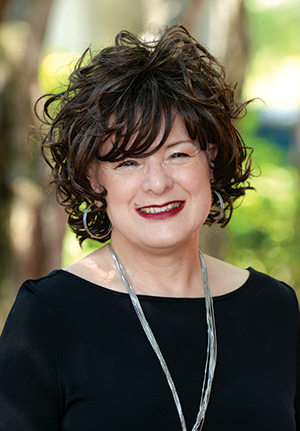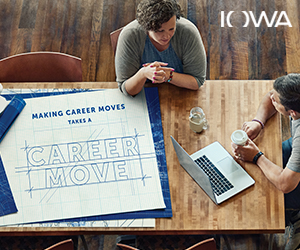Writer: Megan VerHelst

Equality in the workplace is a priority for Randy Ramlo, chief executive officer of Cedar Rapids-based United Fire Group. When he started at the insurance company 10 years ago, his wife was also employed in a leadership role where, he says, she often had to “act like a man” to successfully do her job. This strengthened his commitment to creating an inclusive workplace.
United Fire Group (UFG) excels in promoting and retaining a female workforce:
- Pay equity in nonmanagement positions: Women earn $1.05 for every dollar earned by men.
- Staffing: Sixty percent of UFG’s workforce consists of women.
- Corporate directors: Forty percent of UFG’s board members are women (not 50 percent, Ramlo notes, but much better than industry peers).
- Management: Like the board, 40 percent of the company’s managers and supervisors are women.
But Ramlo isn’t satisfied yet, and he readily acknowledges the challenges. For example, among the company’s highest-paying positions—for UFG, that’s 10 percent or 100 jobs—only 25 percent are held by women. Women within the company often are reluctant to apply for management positions unless they believe they are “110 percent” qualified, Ramlo says.
So when the opportunity arose for the company to take Iowa’s EPIC Corporate Challenge—EPIC stands for Economic Potential for Iowa Companies—Ramlo viewed it as a way to heighten awareness of the company’s commitment to gender parity, as well as a resource in responding to challenges.
“The one deficiency we have left to work on [getting more women in top positions] is one that takes a lot of time to move the needle,” Ramlo says. “We had one top executive retire, and we filled his role with a female employee, so we are moving. … We will never put women in a role just because they are women—that sets up failure. But we will continue to work on it, and awareness goes a long way in changing attitudes.”
UFG is one of 50 Iowa companies and organizations that have signed on to the EPIC Corporate Challenge. Launched in spring 2016, the challenge is a statewide public-private effort to increase the representation of women in leadership roles. Challenge partners include the nonprofit group Iowa Women Lead Change, Iowa Workforce Development, the Iowa Economic Development Authority and the office of Iowa Gov. Kim Reynolds.
Making a Pledge
Participating companies pledge to encourage and retain female employees at all levels. The challenge is seen not only as a way to move the needle for women in Iowa, but also as a way to encourage economic development in all communities.
“Women make up more than half of Iowa’s labor force, so it’s important women are fully utilized at all levels in both the private and public sectors,” says Debi Durham, director of the Iowa Economic Development Authority. “If we succeed, our companies and organizations will benefit, our families will benefit, and, as a result, Iowa’s economy will benefit.
“Whether it’s helping our existing companies to grow or attracting new companies to our state, having these forward-looking, public-private partnerships shows employers that we are engaged in the issues that are imperative to their success,” Durham adds.
The EPIC Corporate Challenge started in central Iowa prior to its statewide launch. Disappointed by the lack of change in the number of women serving on boards or occupying high-level positions at work, and by an increasing gender pay gap, the Des Moines-based Nexus Executive Women’s Alliance launched three study groups in 2012 to determine the main issues facing Iowa women. Those issues were political equality, pay equity, and organizational and home structures, says Leisha Barcus, president of Nexus.
“I have two daughters, and I felt that I couldn’t remain complacent and wait for the next study to reveal a similar lack of progress for women in Iowa,” Barcus says. “I wanted to help create equal opportunity for them to succeed, however they defined that for themselves.”
The EPIC Corporate Challenge resulted from studying those three issues over three years, and a business case was developed to present to central Iowa companies. It was Nexus that named the challenge, notes Barcus. The group settled on “EPIC” because it was most descriptive of what members were trying to help businesses understand: the economic potential within reach by including more women in senior leadership.
The EPIC Corporate Challenge was unveiled at an October 2015 event in Des Moines to a small group of central Iowa business leaders, ones Nexus hoped would be champions for both the challenge and its goals. It was important to find male leaders with whom Nexus members could test the message, Barcus says. Most of these business leaders jumped at the opportunity to take the pledge.
Measuring Progress
The original vision was not only to get the business case in front of as many companies as possible, but to get companies to commit to doing something about the issues facing Iowa—in other words, measuring and reporting their findings and progress.
“We know what gets measured gets managed,” Barcus says.
But to distribute the business case to a large number of businesses, Nexus members recognized the initiative needed to be managed by an organization with the infrastructure and personnel in place to do it justice. After the public launch of the EPIC Corporate Challenge in spring 2016, Nexus reached an agreement with the Iowa Women’s Leadership Council, giving leadership of the challenge to the Cedar Rapids nonprofit.
Before taking the helm of the challenge, Diane Ramsey, co-founder of IWLC and current co-chair of the EPIC Corporate Challenge, was working with then-Lt. Gov. Kim Reynolds’ office to discuss the possibility of launching a similar initiative statewide. Once Ramsey learned of the work done by Nexus, the two organizations combined resources.
“Based on the research I had done, it was absolutely critical that this initiative become a publicly endorsed program that was privately driven if it was to become successful statewide,” Ramsey says. “So Nexus rolled it out in central Iowa with the understanding that in 2016, we would go statewide. The intention was to do that as soon as a public component was in place.”
In those months between the pilot program rollout and the statewide launch, Reynolds’ office, Iowa Workforce Development and the Iowa Economic Development Authority signed on to be a part of the challenge.
A crucial part of the public partnership has to do with the reporting and tracking of progress by partner companies. Toward that goal, the EPIC Challenge encourages companies to identify and measure the retention of female workers; percentage of female employees in leadership roles; percentage of women in top 10 percent of executive positions; percentage of women on corporate boards; and pay equity. Metrics are reported to Iowa Workforce Development, which tracks progress toward the challenge goals.
Future Ready Iowa
The goals of the challenge align similarly with those of Future Ready Iowa, a state economic development initiative launched in 2016 to build Iowa’s talent pipeline, says Beth Townsend, director of Iowa Workforce Development and co-chair of the EPIC Corporate Challenge.
“The goals of Future Ready Iowa include leveraging all available resources in our state,” Townsend says. “This includes women and getting them into senior leadership positions.”
EPIC partners released a compilation of data collected from participating companies earlier this year. The data also helped provide a baseline for partners to set goals for the coming years. While women currently hold 30 percent of executive and senior-level positions within partner companies, the goal is to reach 35 percent by 2025, Ramsey says. To accomplish this goal and others, IWLC offers resources to Iowa women and businesses, including peer-to-peer sessions for EPIC members, leadership assessments and other programming to prepare high-potential employees for leadership.
Ramsey and Townsend also connect with companies across the state, encouraging those who may be interested to take the pledge. The goal is to have 100 companies signed on by the end of this year, and 500 by 2023. There is no cost to take the pledge, and businesses of any size can participate.
From what she’s observed, Townsend believes the EPIC challenge is building momentum across the state.
“There is no reason not to do this,” she says.







